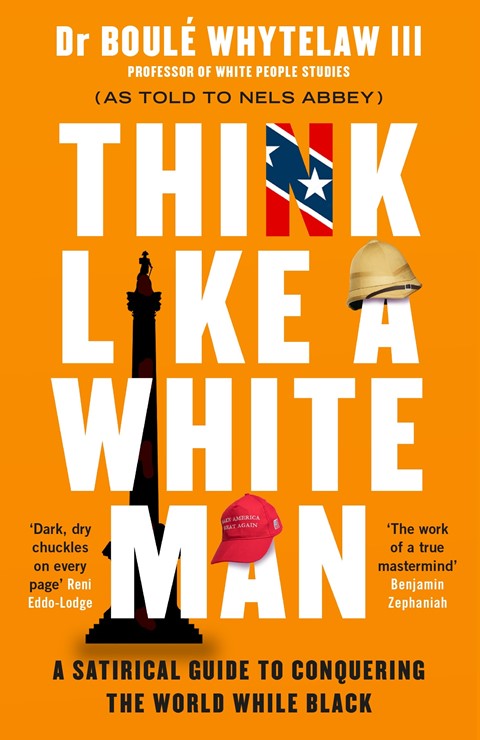Layla Haidrani talks to the author about his new book, Think Like A White Man – now available in the UK – which satirically guides POC and Black readers how to navigate white-dominated workplaces
We might have seen a growing number of Black British authors in recent years, but what marks Nels Abbey’s Think Like A White Man as particularly noteworthy is that this is the very first satire of its kind, guiding POC and Black readers in particular on how to navigate white-dominated workplaces.
Inspired by the British-Nigerian author’s experiences as a banker and media executive, this unapologetic self-help “gospel” is written from the persona of a distinguished (and memorable) Professor of Modern White People Studies, Dr Boulé Whytelaw.
Abbey splits the book into two parts: the first with tips on managing conflict and picking your battles and the second half on networking and how to accrue power. In between some comical footnotes and more serious anecdotes on workplace discrimination, each chapter is interspersed with ten ‘White Man Commandments’ and ‘187 dos and don’ts’ which “explain the rules” on how to get ahead. The result is a brazen take on the contemporary British workplace.
The release is particularly pertinent in the current climate, with publishing also coming under fire for routinely undervaluing Black authors. These events recently led Abbey to co-organise the Black Writers’ Guild. With the book now available in the UK, I called Abbey at his London home to find out what compelled him to write a satirical self-help gospel about the British workplace.
Layla Haidrani: What led you to create Think Like a White Man?
Nels Abbey: I started my career in the corporate world working in asset management. From day one in 2004, much of the entire company mistook me for a security guard when I was waiting in reception. In addition to that, seeing how careers were made and destroyed, I felt it had so much material.
I also wanted to document and highlight the experiences of British Black people in the corporate world, which isn’t often spoken of. All the stories are from my experiences and experiences of my friends around me being Black in the corporate world and are 100 per cent non-fiction. But I couldn’t write it as a straight-laced book, I had to do something entertaining so I made it a satire.
LH: Why did you choose to adopt the persona of a “Distinguished Professor of White People Studies”?
NA: I could not and did not feel comfortable writing Think Like A White Man from my perspective. I thought it would work better if we used a vehicle so I created a different kind of character to write it from that perspective. Also, I felt like from a Black British perspective, we deserved that sort of experimental writing. In terms of satirists, you’d probably struggle to name many non-white satirists. Business books and business satire are normally written by and for white people and I thought it’s time we had our own one too.
In any book, people are always trying to brag about their expertise. I’ve met so many people who are professors of African studies, African American studies, Black studies and Islamic scholars but I’ve never heard a person say they’re an expert on white people. So, I thought if I’m writing the book on race, I’d need to know about white people so I created a world leading professor on white people. Above all, I thought it would be funny and make people stop and think ‘he’s a what?’.
LH: Why did you write such a contentious issue in a tongue-in-cheek style?
NA: You can get more out of the situation if you can make people laugh and the best jokes are the ones that have a lot of truth in them. It’s a very heavy topic, it’s controversial, there’s no doubt about that. Whenever I’ve experienced anything particularly traumatic, I turn to humour. That’s always the way I deal with things and I thought it’s the best way of getting the book’s message across.
LH: Boulé is quite the character. How similar would you say you are to him?
NA: Boulé strikes me as creative person, can be overconfident sometimes and it reflects me to a certain degree. Although I would say I’m quite different to Boulé. There are certain things he would say which I would – or could – not say. He has very unconventional views on my race. I wanted to really and truly write something from a Black perspective who had the freedom of a character like Donald Trump who could say whatever he pleased. That’s a big difference to me as that’s not how I am, I’m actually quite cautious as to what I say.
I wanted Boulé not to pander or care. I wanted him to be like tenured professors in America who won’t be thrown out of universities so there’s nothing for him to lose. I wanted to write a Black man who’s as free as David Starkey.

LH: Why did you decide to focus on being a Black professional in a white-dominated corporate environment?
NA: It’s a uniquely difficult experience. Working in the professional world is difficult for anybody. However, once you throw in a little melanin into the mix, that sometimes subtly overrules everything. It blinds people to potential. The whitest place any Black person could inhabit is the professional world and that’s a place where you’re hyper visible; it’s very clear you’re in the room. It’s like growing up in the countryside in the 1980s and people looking at you walk down the high street thinking “what are you doing here?”. You want to progress and move to the top but how you navigate that is viciously difficult.
LH: Who is the book’s intended audience?
NA: Multiple audiences. I wanted to write a business book that was satirical and written for Black people with white people able to successfully read it. I wanted young Black people going into the workplace and knowing what they’re walking into, with an of understanding of how tough it is. I wanted older Black and POC readers to know these things are really happening and it’s not normal and not healthy but hopefully this will help get through it. I wanted everybody else to understand what the experience was like but particularly white people and white leadership – not just what it’s like to be a Black person in the corporate world but what it’s like to be a Black person reading traditional British literature which didn’t speak to them.
Black people were a key part of the audience, but I have found it heart-warming that white people have really taken a liking too and have responded really well to it.
LH: Think Like A White Man illuminates how getting a job simply isn’t the only hurdle as a Black or POC person. The book also touches on class and light-skinned privilege. Was it emotionally taxing drawing on these subjects?
NA: There were times when it was painful, such as when things didn’t go the way I wanted. When I went through the banking promotions process, I found out about huge pay discrepancies. The pay gap between me and someone who was doing the same job was an 85 per cent difference – let’s say he was earning £100, I got £15.
The key thing that helped is [the reaction from] Black people across professional classes thanking me for writing the book. I was stopped in the street by someone who told me I really helped him get through something difficult. Another guy said I mentally saved his life in terms of what he’s going through. Many POC come up to me about it and white people thank me for explaining my experiences. It does touch and move people so it’s clear that [although] documenting the frustrations for me was painful, it’s a remedy for readers.
LH: In order to succeed, Dr Boulé’s ‘187 do’s and don’ts’ offers tips to assimilate. Is this the only way Black and POC readers can progress?
NA: It depends on what you’re winning. The reality is you’re going to have to give up something at the altar of success. The sad reality is even if the book is satirical, I see it as you’ve got to assimilate to accumulate. Sadly, a lot of people such as Priti Patel, Sajid Javid and Kwasi Kwarteng collaborate in their own subjugation to get to the top. When you’re trying to make it, you have to collaborate with subjugation to a certain degree.
LH: You mentioned that you never thought Think Like A White Man would see the light of day. How difficult was it getting published?
NA: Publishing is a white industry, editorial publishing even more so. Every agent I pitched this book to – and I mean every one – turned it down. They couldn’t see the vision whatsoever. I’m not keen on diversity schemes normally but it took a diversity scheme (Penguin Random House’s Write Now) to give the kiss of life to an anti-diversity scheme book – there’s irony for you.
Think Like a White Man: A Satirical Guide to Conquering the World ... While Black by Nels Abbey is out on July 16, 2020.
